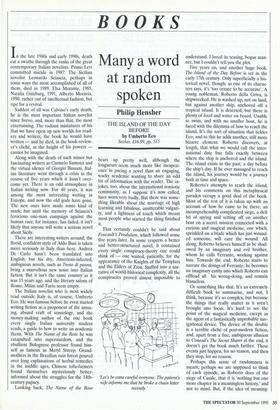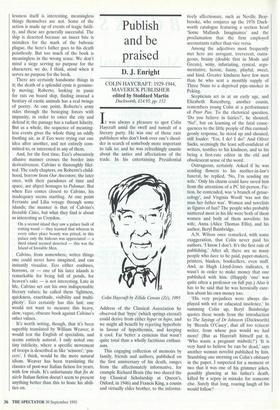BOOKS
Many a word
at random spoken
Philip Hensher
THE ISLAND OF THE DAY BEFORE by Umberto Eco Secker, £16.99, pp. 515 In the late 1980s and early 1990s, death cut a swathe through the ranks of the great contemporary Italian novelists. Primo Levi committed suicide in 1987. The Sicilian novelist Leonardo Sciascia, perhaps in some ways the most accomplished of all of them, died in 1989. Elsa Morante, 1985, Natalia Ginzburg, 1991, Alberto Moravia, 1990, rather out of intellectual fashion, but ripe for a revival.
Saddest of all was Calvino's early death; he is the most important Italian novelist since Svevo, and, more than that, the most entertaining. The radiant miniatures of his that we have open up new worlds for read- ers and writers; the book he would have written — and he died, in the book-review- er's cliché, at the height of his powers cannot be imagined.
Along with the death of such minor but fascinating writers as Carmelo Samona and the virtual silence of Giorgio Bassani, Ital- ian literature went through a crisis in the course of five years which it hasn't over- come yet. There is an odd atmosphere in Italian writing now. For 40 years, it was among the most interesting writing in Europe, and now the old gods have gone. The new ones have made some kind of mark; but until the memory of Sciascia's ferocious one-man campaign against the human race, for instance, has faded, it isn't likely that anyone will write a serious novel about Sicily.
There are interesting writers around; the florid, confident style of Aldo Busi is taken more seriously in Italy than here. Andrea De Carlo hasn't been translated into English, but his dry, American-infected, ambiguous novels, such as Treno di panna, bring a marvellous new noise into Italian fiction. But it isn't the same country as it was 15 years ago, and the literary salons of Rome, Milan and Turin seem empty.
The Italian novelist who is most widely read outside Italy is, of course, Umberto Eco. He was famous before he even started writing fiction as a proponent of the amus- ing, absurd craft of semiology, and the money-making author of the one book every single Italian university student reads, a guide to how to write an academic thesis. With The Name of the Rose he was catapulted into superstardom, and the ebullient Bolognese professor found him- self as famous as Meryl Streep. Grand- mothers in the Brazilian rain forest poured over long explanations of herbal remedies in the middle ages, Chinese tofu-farmers found themselves mysteriously better- informed about the struggles for the 14th- century papacy.
Looking back, The Name of the Rose bears up pretty well, although the longueurs seem much more like inexperi- ence in pacing a novel than an engaging, wacky academic wanting to share an odd bit of information with the reader. The in- jokes, too, about the international semiotic community, as I suppose it's now called, have worn very badly. But there was some- thing likeable about the marriage of high learning and fabulous, unutterable vulgari- ty, and a lightness of touch which meant most people who started the thing finished it.
That certainly couldn't be said about Foucault's Pendulum, which followed some five years later. In some respects a better and better-structured novel, it contained every single conspiracy-theory one could think of — one waited, patiently, for the appearance of the Knights of the Templars and the Elders of Zion. Stuffed into a nar- rative of world-historical complexity, all the conspiracies proved almost impossible to 'Let's be extra careful everyone. The patient's wife informs me that he broke a chain letter recently.' understand. I loved its teasing, bogus man- ner, but I couldn't tell you the plot.
Five years on, and another huge book. The Island of the Day Before is set in the early 17th century. Only superficially a his- torical novel, though; as one of its charac- ters says, it's `too ornate to be accurate'. A young nobleman, Roberto della Griva, is shipwrecked. He is washed up, not on land, but against another ship, anchored off a tropical island. It is deserted, but there is plenty of food and water on board. Unable to swim, and with no smaller boat, he is faced with the dilemma of how to reach the island. It's the sort of situation that tickles Eco, and to this he adds another, still more bizarre element. Roberto discovers, at length, that what we would call the inter- national date line falls exactly between where the ship is anchored and the island. The island exists in the past; a day before the ship's day. If he ever managed to reach the island, his journey would be a journey both in time and space.
Roberto's attempts to reach the island, and his comments on this metaphysical paradox occupy a good deal of the book. Most of the rest of it is taken up with an account of how he came to be there; an incomprehensibly complicated siege, a deft bit of spying and setting off on another boat on a secret mission connected with a curious and magical medicine, one which, sprinkled on a blade which has just wound- ed someone, will cure the wound. All along, Roberto believes himself to be shad- owed by an imaginary and evil brother, whom he calls Ferrante, working against him. Towards the end, Roberto starts to narrate the doings of Ferrante; he becomes an imaginary entity into which Roberto can offload all his wrong-doing, and remain blameless.
Or something like that. It's an extremely difficult book to summarise, and not, I think, because it's so complex, but because the things that really matter in it aren't brought into focus. It's hard to see the point of the magical medicine, except as the agent of a fantastically improbable nav- igational device. The device of the double is a terrible cliché of post-modern fiction, and, apart from a fine, ambiguous allusion to Conrad's The Secret Sharer at the end, it doesn't get the book much further. These events just happen, for no reason, and then they stop, for no reason.
Perhaps this sense of randomness is meant; perhaps we are supposed to think of each episode, as Roberto does of the siege of Casale, that it is 'nothing but one more chapter in a meaningless history,' and not to mind. But, if the idea of meaning- lessness itself is interesting, meaningless things themselves are not. Some of the action is made up of events of tragic futili- ty, and these are generally successful. The ship is deserted because an insect bite is mistaken for the mark of the bubonic plague, the hero's father goes to his death pointlessly. But too much of the book is meaningless in the wrong sense. We don't mind a siege serving no purpose for the characters; we do, I think, mind when it serves no purpose for the book.
There are certainly handsome things in it; the death of a splendid cynic is genuine- ly moving; Roberto, looking in panic for rats on board ship, finding instead a bestiary of exotic animals has a real twinge of poetry. At one point, Roberto's army rides through the besieging forces with impunity, in order to enter the city and defend it; the passage has a radiant hilarity. But as a whole, the sequence of meaning- less events gives the whole thing an oddly footling air, as if Eco were trying out one idea after another, and not entirely com- mitted to, or interested in any of them.
And, for the first time, Eco's obsessively allusive manner crosses the border into derivativeness. Calvino is thoroughly filet- ted. The early chapters, on Roberto's child- hood, borrow from Our Ancestors; the later ones, with their paradoxes of time and space, are abject homages to Palomar. But when Eco comes closest to Calvino, his inadequacy seems startling. At one point Ferrante and Lilia voyage through some islands; the manner is that of Calvino's Invisible Cities, but what they find is about as interesting as Croydon.
On a second island they saw a palace built of rotting wood — they learned that whereas in every other place beauty was prized, in this palace only the hideous was appreciated — a third island seemed deserted — this was the Island of Invisible Men.
Calvino, from somewhere, writes things one could never have imagined, and can instantly visualise. Eco either confuses, borrows, or — one of his later islands is remarkable for being full of ponds, for heaven's sake — is not interesting. Late in life, Calvino set out his own indispensable literary values; he called them 'lightness, quickness, exactitude, visibility and multi- plicity'. Eco certainly has this last; one would not want to measure this heavy, slow, vague, obscure book against Calvino's other values.
It's worth noting, though, that it's been superbly translated by William Weaver; it would test the English of specialists, and seems entirely natural. I only noted one tiny infelicity, where a specific movement of troops is described as like `scissors'; `pin- cers', I think, would be the more natural idiom. Weaver has been translating the classics of post-war Italian fiction for years, with few rivals. It's unfortunate that fin de siecle Italian fiction doesn't seem to present anything better than this to hone his abili- ties on.



































































 Previous page
Previous page